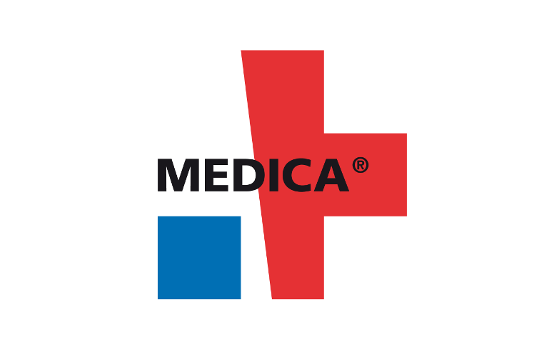 16 - 19 November 2020, Düsseldorf, Germany.
16 - 19 November 2020, Düsseldorf, Germany.From the early diagnosis of arthritis to a sustainable energy source and the Wearable, which non-invasively determines the level of urine in the bladder: The great variety of digital health innovations was again reflected this year at the world's leading medical trade fair MEDICA, which, due to a pandemic, took place completely in virtual format as virtual.MEDICA. The creative start-up scene was able to compete in two competitions at the same time, offering a firework of ideas: the 9th MEDICA Start-up COMPETITION and the '12th HEALTHCARE INNOVATION WORLD CUP'.
The winner of the MEDICA Start-up COMPETITION 2020 was Radiobotics from Denmark. Stine Mølgaard Sørensen, co-founder of Radiobotics, presented 'RBknee' in the pitch session. This is the young company's first CE-certified product. It automatically generates findings relevant for the radiological diagnosis of osteoarthritis of the knee and presents them in a text report including conclusions. In addition, it visually displays what the algorithm has detected. In an interview with MEDICA.de, Sørensen emphasises that the company develops robust and clinically validated algorithms for the radiology of the musculoskeletal system. Radiology - and X-rays in particular - are, in her opinion, particularly suitable for evaluation by algorithms, as images are two-dimensional and can be evaluated relatively easily. The software should free the doctor from routine examinations and increase throughput by automating the analysis and reporting of routine X-ray images and optimising the workflow. Radiobotics is primarily aimed at use in diseases with relatively low risk but high rates of use. "We want to develop something that we can use right now," says Sørensen. To do this, the software works with the widely used picture archiving system PACS. Sørensen reports that Radiobotics is cooperating with Berlin's Charité hospital and is thus gaining experience in working with German hospitals. The start-up is headquartered in Copenhagen and sees great potential in the European market. The attention that winning the MEDICA Start-up COMPETITION 2020 will bring gives further impetus to the further development of the company. In the next six months, the company plans to move into the USA and Great Britain. In order to be prepared for internationalisation, a further round of investments is planned.
ETH Zurich was also able to climb the virtual winners' podium of MEDICA start-up COMPETITION 2020 with the development of 'MYLEG'. The aim is to give leg amputees back the feeling of walking. This is because a lack of feeling and thus the lack of feedback from the feet can often lead to falls. A new type of additional device, which is used in addition to the commercially available prosthesis, prevents this. It provides feedback via an insole with sensors in combination with a portable stimulator embedded in a belt. The ETH Zurich team was thus able to take third place.
Bio fuel cell for disposable medical devices
With BeFC, a French start-up took second place at the 9th MEDICA Start-up COMPETITION. It was also one of the three equal 1st place winners at the HEALTHCARE INNOVATION WORLD CUP 2020, although what the start-up offers is not, at first glance, in the health sector. "At BeFC, we primarily design and produce our innovative paper-based biofuel cell, which is intended to serve as a sustainable and environmentally friendly energy solution for Internet-of-things devices and connected applications with low power consumption," report Jules Hammond, BeFC Managing Director, and Dr. Marie Berthuel, Senior Scientist & Communication Manager. A closer look reveals the sense of the use of this product in the healthcare market, where disposable medical devices are often used, for example to reduce the risk of contamination. However, these devices are usually powered by button or button cell batteries. Such miniature batteries are usually sealed in the product. Therefore, according to BeFC, recycling can be complex, time consuming and expensive. "BeFC solves this ecological dilemma by offering a sustainable alternative to conventional miniature batteries," Hammond and Berthuel describe after winning the prizes at virtual.MEDICA 2020. Now BeFC wants to focus on industrial testing of paper fuel cells and changing the production process, the two explained after the announcement of the winner and added to MEDICA.de: "We also want to expand our team with talented and experienced people to support our growth. We also hope to continue to work with innovative companies to develop the next generation of environmentally friendly IoT devices - as our slogan summarises: 'Driving the future together with nature'".No less interesting are the two other winners of the Innovation World Cup 2020. inContAlert from Germany presented an application of the same name, 'inContAlert' being a system for non-invasive measurement of the bladder filling level. And a huge market potential could be opened up for PKvitality with the 'K'Watch' application. This is the first system to measure blood sugar via a Smartwatch.
The 9th MEDICA Start-up COMPETITION and the 12th Healthcare Innovation World Cup were part of the MEDICA CONNECTED HEALTHCARE FORUM, which, as the English language programme component of virtual.MEDICA, offered a variety of 36 sessions (with 56 speakers) on current digital health trends and innovations over the four days of the event. A compact review of the highlights of the forum and the start-up competitions is available online at: https://www.medica-tradefair.com/en/Forums_Conferences/Forums/MEDICA_CONNECTED_HEALTHCARE_FORUM/MCHF_Overview_Program.
virtual.MEDICA 2020 and the parallel supplier trade fair virtual.COMPAMED 2020 attracted a total of 45,000 unique users from 169 countries, who used the virtual event offerings to generate 405,000 page impressions.
MEDICA 2021 and COMPAMED 2021 will be held from 15 to 18 November 2021 in a hybrid concept consisting of a combination of live platforms for trade visitors at the Düsseldorf Exhibition Centre plus virtual offers.